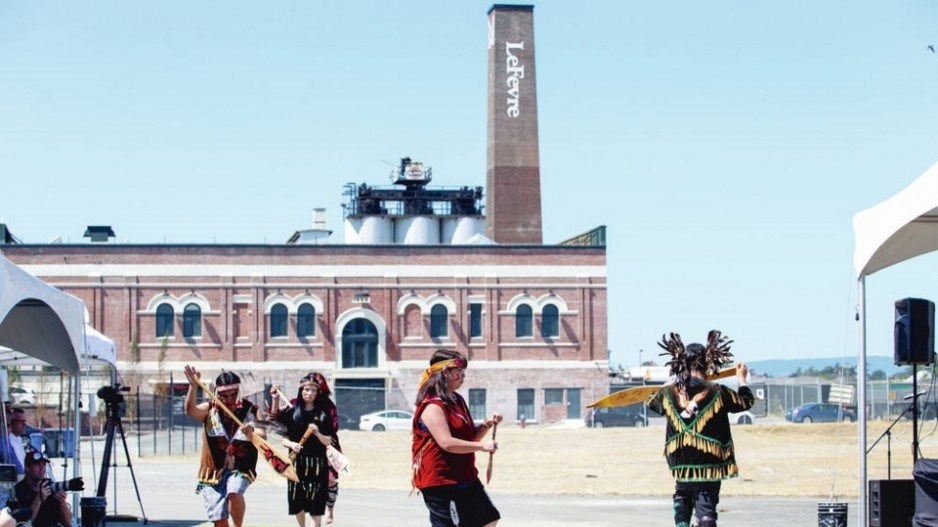The chiefs of the Songhees and Esquimalt First Nations made official the purchase of 4.5 acres of their traditional lands in Rock Bay from B.C. Hydro on Tuesday, a land sale decades in the making.
It started with conversations the chiefs’ late uncles, former Songhees chief Robert Sam and former Esquimalt chief Andy Thomas, had with B.C. Hydro years ago.
“It’s been a long time coming,” said Esquimalt Chief Robert Thomas, who called the “back and forth” between B.C. Hydro and Matulia Holdings, the two nations’ company, over the decades long and arduous. “But to see it finally come to fruition is fantastic. We’re getting our land back piece by piece, whether we have to pay for it or not.”
“This means so much to our people — to be able to share in the economic benefits of this land is going to be a beautiful thing for both nations.”
Songhees Chief Ron Sam said standing on the clean and level ground Tuesday was a chance to finish the work started by his uncle.
“We’re now really seeing that come to an end and it’s now the next chapter, which is community engagement and seeing what our community wants to do with the land now that we’re owners.”
The site, bordered by Government and Pembroke streets and Rock Bay inlet, was at one point home to Victoria Gas and B.C. Electric — predecessors of B.C. Hydro. It’s been behind barriers for years as B.C. Hydro spent more than $128 million and 12 years to remediate what was one of the most contaminated sites in the country.
A total of 140,000 tonnes of contaminated soil was removed from the site. Another 88,000 tonnes of sediments and foreshore was also removed and Rock Bay was drained and dredged.
The land is adjacent to three acres the two First Nations acquired in 2016 from Transport Canada and gives the site its waterfront.
Sam, who sits on the board of Matulia Holdings, said they have hired an architect and will now begin an engagement process with the Esquimalt and Songhees First Nations that could take up to two years.
He said the site could used for anything from a downtown university to an arts and culture district, a tech hub or something no one has considered yet.
“Right now there’s no vision and I think that’s the fun part — it’s a blank slate,” he said.
Currently the Ralmax Group of Companies has a lease to use some of the land as storage.
Sam said the entire site is available for short-term lease, as one large space or a few separate lots, so the land pays for itself while Matulia determines what it will ultimately look like.
“It also allows us time to really work with the community and not be rushed into a decision,” he said.
Victoria Mayor Lisa Helps said the sale puts the Songhees and Esquimalt people back in the heart of their territory with economic development opportunity.
“To be here today to bear witness to this is really, really moving and really important,” she said. “The city commits to walking the next years and decades with you on these lands in a government-to-government relationship.”
B.C. Hydro chief executive Chris O’Riley said it was great to be able to sign over the property, a move that has been in the works since the 1990s and that he has worked on for nearly 15 years.
“I’m really pleased to see the land is finally cleaned up and that we’ve been able to make this transfer to the Songhees and Esquimalt. I’m really proud to be here today,” he said in an interview. “It’s not often you get to celebrate something like this.”
The title to the land was officially transferred to Matulia Holdings June 30. Financial terms were not disclosed.




